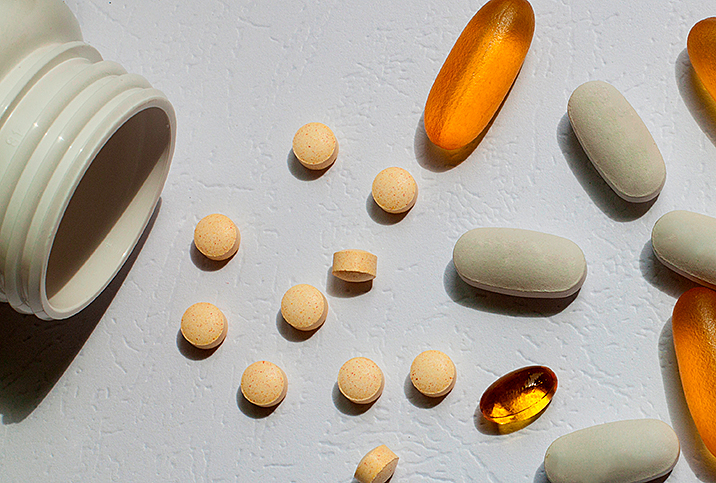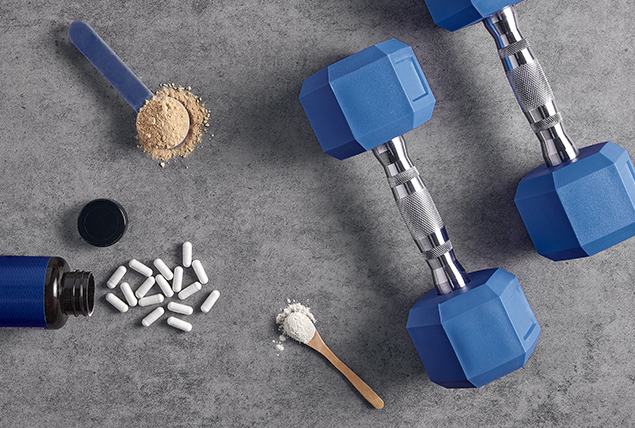Ensure You Are Getting the Right Amount of Daily Vitamins

Every day, more than three quarters of Americans consume some form of dietary supplement. Additional vitamins can play a vital role in bridging the gap between the nutrients or minerals you're not getting from food or the ones your body doesn't make enough of itself.
However, the increase in vitamin subscriptions, bundles and gummies marketed to improve your skin, acne and even weight loss can make shopping for supplements overwhelming. And if you're already subscribing to a vitamin delivery service, you may be taking too many.
But are too many vitamins an issue? Is a one-size-fits-all multivitamin the best answer? How do you know exactly which vitamin you need to stay healthy? We'll get into all of the ins and outs and help you decide what's worth taking and what is nothing more than marketing gimmickry.
Vitamins 101: What are they and who needs them?
Vitamins and supplements (often used interchangeably) are actually quite different. Vitamins are organic chemicals or micronutrients our bodies need to function properly and thrive.
There are 13 essential vitamins required by your body:
- Vitamin A. A fat-soluble vitamin that's good for vision, reproductive function and your immune system. Also helps your lungs, kidneys, heart and other major organs.
- Vitamin B1. Known as thiamine, vitamin B1 is good for diabetes, helps with depression, boosts energy and can reduce sepsis.
- Vitamin B2. Known as riboflavin, vitamin B2 is an important component of the coenzymes that help the growth of cells, energy production and the breakdown of steroids and fats.
- Vitamin B3. Known as niacin, vitamin B3 is a part of the process of converting food into energy. Niacin also keeps hair, skin and the nervous system healthy.
- Vitamin B5. Known as pantothenic acid, vitamin B5 is used for breaking down food into energy, but its most important function is in the production of blood cells.
- Vitamin B6. Known as pyridoxine, vitamin B6 is key to maintaining healthy nerves, skin and red blood cells.
- Vitamin B7. Known as biotin, vitamin B7 has an important role in metabolism regulation and the function of your nervous system. This nutrient is also vital for healthy nails, skin and hair.
- Vitamin B9. Known as folate or folic acid, vitamin B9 helps in the formation of red blood cells and overall cell growth and function. It's also critical to reduce the risk of birth defects in the brain and spine during the early months of pregnancy.
- Vitamin B12. Known as cyanocobalamin, vitamin B12 keeps your blood and nerve cells healthy. It's also involved in the production of DNA and helps prevent a blood condition called megaloblastic anemia that can make you feel weak and tired.
- Vitamin C. Known as ascorbic acid, vitamin C is essential to form blood vessels, cartilage, muscle and collagen in bones, and for the repair and regrowth of tissue throughout your body.
- Vitamin D. Known as calciferol, vitamin D helps you to regulate your neuromuscular system and immune system, and is key in promoting the life cycle of your cells.
- Vitamin E. The primary function of vitamin E is to strengthen your immune system against infection.
- Vitamin K. This group of vitamins is responsible for blood clotting and helping wounds to heal properly and quickly. It's thought that vitamin K also helps keep bones healthy.
Supplements, on the other hand, can contain vitamins or other nutrients designed to add benefit to your health.
"The best way to get your vitamins and minerals is from natural sources, namely our diet, or in the case of vitamin D, safe exposure to sunlight," said Ben Coomber, a personal trainer and nutrition coach based in Ipswich, England. "However, it can be challenging for the average person to do this, which is why vitamin supplements have become increasingly popular."
Whether you need vitamins or not depends on your individual health. A blood test can determine if your body is lacking any essential vitamins. If you find you're lacking a certain vitamin, turning to food sources is generally recommended first.
"The best sources of vitamins are usually fruits and vegetables, particularly leafy greens and berries," Coomber continued. "Animal organs, such as the kidney and liver, are also very high in micronutrient content."
But if you're unable to get essential minerals from food sources, vitamins can help make the difference.
Are vitamins risky to your health?
If you take a prescription medication, vitamins can sometimes interfere with the way your medication works, preventing you from getting the help your body needs.
"Prescription medications can change the way the body absorbs or utilizes certain micronutrients, raising or lowering overall levels," said Hayley Miller, M.S., RDN, a registered dietitian and nutritionist at Persona Nutrition, based in Snoqualmie, Washington. "If you're already taking a prescription medication, it's best to speak with your physician before starting a daily vitamin program or turn to a personalized vitamin program that cross-references prescription medications before curating your own vitamin pack."
Talking to your doctor can help you avoid serious side effects. Miller notes a few common nutrient drug-vitamin interactions, including:
- Blood pressure medication and iron. Taking an iron supplement within two hours of your blood pressure prescription can decrease its absorption rate.
- Synthetic thyroid hormones and soy, iron and calcium. If you're on thyroid medication with synthetic hormones, ingesting soy, iron or calcium from a supplement within four hours of taking your medication can reduce its absorption rate.
On the flip side, some vitamins and supplements may be recommended for consumption with your prescription, because some medications are known to deplete your body of essential nutrients.
Can you take too many vitamins?
The biggest risk you run when taking a large variety of vitamins and nutrients is wasting money. Besides that, taking a vitamin when your body is already receiving enough of that particular vitamin is safe, so long as you're following dosage recommendations.
So how do you know if you're taking too much of a specific vitamin? Sometimes there are visible signs, but a thorough blood panel is the best way to monitor your vitamin levels.
"Sometimes when you take a new supplement with B vitamins or carotenoids, it may cause discoloration of your urine," Miller said. "Specifically, brightly neon-colored urine may be a sign the body is excreting excess riboflavin or vitamin B2. But this is a harmless process as all B vitamins are water-soluble and excreted in the urine. The risk of toxicity is low with most vitamins and minerals that are water-soluble. Additionally, the dosage in most supplements should have a wide margin of safety to ensure the dosage does not come close to or exceed the daily upper limit."
Miller noted that too much of anything is rarely good. If you suspect you're taking too many vitamins or feeling off despite your supplementation, talk with your doctor.
Our bodies need essential vitamins and minerals to survive—but if you're self-diagnosing, there's a chance you're taking too many vitamins or the wrong vitamins. And while you're probably not harming yourself, you may be wasting money on something you really don't need.
While supplementing is often better than remaining deficient in a particular vitamin, you should aim to get your nutrients from food sources, when possible or work with your doctor on determining the right vitamin and dose for your body.


















